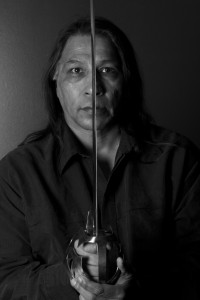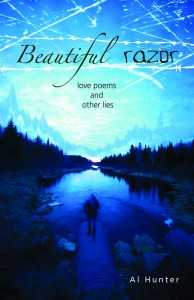Anatoliy Gruzd – Automated Discover and Visualization of Communication Networks from Social Media
Webcast sponsored by the Irving K. Barber Learning Centre and hosted by the School of Library, Archival, and Information Studies (SLAIS). As social creatures, our online lives just like our offline lives are intertwined with others within a wide variety of social networks. Each retweet on Twitter, comment on a blog or link to a Youtube video explicitly or implicitly connects one online participant to another and contributes to the formation of various information and social networks. Once discovered, these networks can provide researchers with an effective mechanism for identifying and studying collaborative processes within any online community. However, collecting information about online networks using traditional methods such as surveys can be very time consuming and expensive. The presentation will explore automated ways to discover and analyze various information and social networks from social media data.
Biography
Anatoliy Gruzd is Assistant Professor in the School of Information Management and Director of the Social Media Lab at Dalhousie University. His research initiatives explore how social media and other web 2.0 technologies are changing the ways in which people disseminate knowledge and information and how these changes are impacting social, economic and political norms and structures of our modern society. Dr. Gruzd is also actively developing and testing new web tools and apps for discovering and visualizing information and online social networks. The broad aim of his various research initiatives is to provide decision makers with additional knowledge and insights into the behaviors and relationships of online network members, and to understand how these interpersonal connections influence our personal choices and actions.
Select Articles Available at UBC Library
Gruzd, A., Staves, K., Wilk, A. (2012). Connected Scholars: Examining the Role of Social Media in Research Practices of Faculty using the UTAUT model.Computers in Human Behavior 28 (6), 2340-2350. Link: http://www.sciencedirect.com/science/article/pii/S074756321200204X
Gruzd, A., and Sedo, D.R. (2012) #1b1t: Investigating Reading Practices at the Turn of the Twenty-first Century. Journal of Studies in Book Culture, Special issue on New Studies in the History of Reading 3(2). Link: http://www.erudit.org/revue/memoires/2012/v3/n2/1009347ar.html
Takhteyev, Y., Gruzd, A., and Wellman, B. (2012). Geography of Twitter Networks. Social Networks, Special issue on Space and Networks, 34(1): 73-81. Link: http://www.sciencedirect.com/science/article/pii/S0378873311000359
UBC Library Research Guides
Carol Tilley – Children, Comics, Critics, and the Researcher
In April 1953, eleven-year old Brian McLaughlin wrote to psychiatrist Fredric Wertham in response to the latter’s article in Reader’s Digest, “Comic Books – Blueprints for Delinquency.” The boy asserted confidently: “Anybody that goes out and kills someone because he read a comic book is a simple minded idiot. Sound silly? So does your item.” McLaughlin was not the only young person to critique Wertham’s argument about comics: dozens more wrote him in 1953 and 1954.
In the late 1940s and culminating in 1954 with the publication of Wertham’s book Seduction of the Innocent and the televised hearings on comics held by a United States subcommittee, comic books were the most contested form of print. Young readers could not get enough of them, purchasing more than a billion new comic books issues a year in the early 1950s. Adult critics such as Wertham feared, that by reading these four-color pamphlets full of stories of superheroes, cowboys, and jungle queens, young people would stunt their cultural development, ruin their eyesight, and fall into lives of depravity.
This presentation draws in part from Wertham’s manuscript collection at the Library of Congress and the archival record of the 1954 Senate hearings to document and analyze some of the ways young readers challenged and protested adults’ understanding of comic book reading. Carol Tilley, Assistant Professor at the University of Illinois at Urbana-Champaign, did not expect to find letters from young comics readers when she explored these collections. The discovery of these narratives has prompted me to extend this investigation into locating more descriptions of children’s reading experiences – many of which are unfiltered and unmediated by adults—that can serve as potent evidence to enrich scholarship in children’s print culture.”
Biography
Carol L. Tilley is an Assistant Professor in the Graduate School of Library and Information Science at the University of Illinois Urbana-Champaign, where she teaches courses in comics’ reader’s advisory, media literacy, and youth services librarianship. Part of her scholarship focuses on the intersection of young people, comics, and libraries, particularly in the United States during the mid-twentieth century. Her research has been published in journals including the Journal of the American Society for Information Science and Technology (JASIST), Information & Culture: A Journal of History, and Children’s Literature in Education. A former high school librarian, she is also co-editor of School Library Research, the peer-reviewed online journal of the American Association of School Librarians.
Select Articles Available at UBC Library
Peoples, B. & Tilley, C. (2011). Podcasts as an Emerging Information Resource. College & Undergraduate Libraries, 18:1, 44-57. Link: http://www.tandfonline.com/doi/abs/10.1080/10691316.2010.550529#.UcCe8ueG2Sp
Tilley, C. (2012). Seducing the Innocent: Fredric Wertham and the Falsifications That Helped Condemn Comics. Information & Culture: A Journal of History, Volume 47, Number 4, 2012, 383-413. Link: http://muse.jhu.edu/journals/libraries_and_culture/v047/47.4.tilley.html
UBC Library Research Guides:
Irving K. Barber Learning Centre Celebrates Black History Month in February 2013
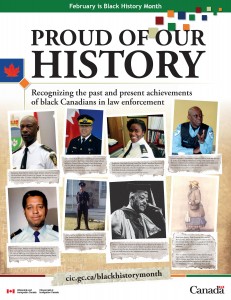 Every year, Canadians are invited to participate in Black History Month festivities and events that honour the legacy of black Canadians, past and present. Canadians take this time to celebrate the many achievements and contributions of black Canadians who, throughout history, have done so much to make Canada the culturally diverse, compassionate and prosperous nation it is today. During Black History Month Canadians can gain insight into the experiences of black Canadians and the vital role this community has played throughout our shared history.
Every year, Canadians are invited to participate in Black History Month festivities and events that honour the legacy of black Canadians, past and present. Canadians take this time to celebrate the many achievements and contributions of black Canadians who, throughout history, have done so much to make Canada the culturally diverse, compassionate and prosperous nation it is today. During Black History Month Canadians can gain insight into the experiences of black Canadians and the vital role this community has played throughout our shared history.
Despite a presence in Canada that dates back farther than Samuel de Champlain’s first voyage down the St. Lawrence River, people of African descent are often absent from Canadian history books. There is little mention of the fact that slavery once existed in the territory that is now Canada, or that many of the Loyalists who came here after the American Revolution and settled in the Maritimes were Blacks. Few Canadians are aware of the many sacrifices made in wartime by black Canadian soldiers, as far back as the War of 1812.
In an attempt to heighten awareness of black history in the United States, historian Carter G. Woodson proposed an observance to honour the accomplishments of black Americans. This led to the establishment of Negro History Week in 1926. Woodson is believed to have chosen February for this observance because the birthdays of the renowned abolitionist Frederick Douglass (February 14) and former U.S. President Abraham Lincoln (February 12) fall in this month. During the early 1970s, the week became known as Black History Week. It was expanded into Black History Month in 1976. In December 1995, the House of Commons officially recognized February as Black History Month, following a motion introduced by the first black Canadian woman elected to Parliament, the Honourable Jean Augustine.
The Irving K. Barber Learning Centre is proud to host a display exhibition of resources for Black History Month located on the second floor foyer display case exhibition.
Here are some resources about Black History Month
Reading list compiled by the Toronto Public Library – Link
Hogan’s Alley Resource guide created by the Vancouver Public Library – Link
Black History in Canada Education Guide – Link
Anthony Grafton – Apocalypse in the stacks? The research library in the age of Google
What is the research library in the age of Google? Dr. Anthony Grafton provides the perspective of a humanist scholar on recent changes in research libraries that have been brought about by increased digitization. By examining changes that have occurred over the last forty years in the way that scholars conduct their research and where the library fits in, Grafton sees four crises that today’s academic libraries must face: financial, spatial, use, and accessibility. According to Professor Grafton, a research library should provide not only physical space where scholars can pursue research in books, but also virtual space where they can collect, store, and exploit electronic resources – an ingenious way to pull humanists, teachers, and students alike back into public workspace, in an environment that has the open, collective quality of a laboratory, but also meets the needs of researchers who work with texts, images, and sounds. This talk was hosted by Green College as part of its Cecil H. and Ida Green Visiting Professor lecture series on March 20, 2013 at the Victoria Learning Theatre (Room 182), Irving K. Barber Learning Centre.
Reference:
Grafton, Anthony. “Apocalypse in the stacks? The research library in the age of Google.” Daedalus 138.1 (2009): 87-98. [Link]
Speaker Bio
Professor Anthony Grafton is Henry Putnam University Professor of History at Princeton University. His current project is a large-scale study of the science of chronology in 16th- and 17th-century Europe: how scholars attempted to assign dates to past events, reconstruct ancient calendars, and reconcile the Bible with competing accounts of the past. He hopes to reconstruct the complex and dramatic process by which the biblical regime of historical time collapsed, concentrating on the first half of the 17th century. He has taught both undergraduate and graduate courses on art, magic, and science in Renaissance Europe and on the history of books and readers; undergraduate seminars on historiography; and the history components of the intensive four-course introduction to Western civilization offered to undergraduates by the Program in Humanistic Studies.
Are you interested in viewing more Irving K. Barber Learning Centre webcasts? Please find here for our archived recordings.
Andrew Kaufman, Camille Martin and Barry Webster
ANDREW KAUFMAN, CAMILLE MARTIN and BARRY WEBSTER
at the Robson Reading Series
Thursday, March 14, 2013, 7pm
UBC Bookstore at Robson Square
Robson Reading Series events are free and open to the public but registration is recommended. To register for this event, please click here.
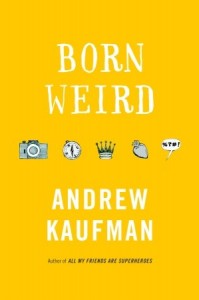
Born Weird (Random House of Canada) tells the tale of the Weird family who have always been a little off, but not one of them ever suspected that they’d been cursed by their grandmother.
At the moment of the births of her five grandchildren Annie Weird gave each one a special power. Richard, the oldest, always keeps safe; Abba always has hope; Lucy is never lost and Kent can beat anyone in a fight. As for Angie, she always forgives, instantly. But over the years these so-called blessings ended up ruining their lives.
Now Annie is dying and she has one last task for Angie: gather her far-flung brothers and sisters and assemble them in her grandmother’s hospital room so that at the moment of her death, she can lift these blessings-turned-curses. And Angie has just two weeks to do it.
What follows is a quest like no other, tearing up highways and racing through airports, from a sketchy Winnipeg nursing home to the small island kingdom of Upliffta, from the family’s crumbling ancestral Toronto mansion to a motel called Love. And there is also the search for the answer to the greatest family mystery of all: what really happened to their father, whose maroon Maserati was fished out of a lake so many years ago?
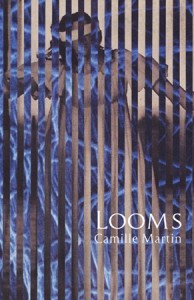
 The title of Looms signifies the weaving tool as well as the shadowing appearance of something, These “woven tales” were inspired by Barbara Guest’s statement that a tale “doesn’t tell the truth about itself; it tells us what it dreams about.” The strands of their surreal allegories converse, one idea giving rise to another, and the paths of their dialogue become the fabric of the narrative. In a second meaning, something that looms remains in a state of imminent arrival. Such are these tales, like parables with infinitely deferred lessons.
The title of Looms signifies the weaving tool as well as the shadowing appearance of something, These “woven tales” were inspired by Barbara Guest’s statement that a tale “doesn’t tell the truth about itself; it tells us what it dreams about.” The strands of their surreal allegories converse, one idea giving rise to another, and the paths of their dialogue become the fabric of the narrative. In a second meaning, something that looms remains in a state of imminent arrival. Such are these tales, like parables with infinitely deferred lessons.
Camille Martin is the author four collections of poetry: Looms (Shearsman Books), Sonnets, Codes of Public Sleep, and Sesame Kiosk (out of print). A chapbook, If Leaf, Then Arpeggio, was recently released from Above/Ground Press.
She has presented and published her work internationally. One of her current poetry projects is “Blueshift Road.” She’s also working on “The Evangeline Papers,” a poetic sequence based on her Acadian/Cajun heritage and her participation in archaeological digs at an eighteenth-century village in Nova Scotia, where her finds included ancestral pipes and wine bottles. Martin earned an MFA in Poetry from the University of New Orleans and a PhD in English from Louisiana State University.
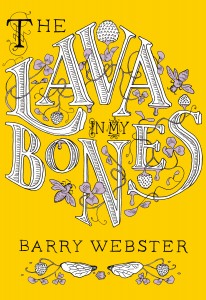 In Barry Webster‘s latest novel, The Lava in My Bones (Arsenal Pulp Press), a frustrated Canadian geologist studying global warming becomes obsessed with eating rocks after embarking on his first same-sex relationship in Europe. Back home, his young sister is a high-school girl who suddenly starts to ooze honey through her pores, an affliction that attracts hordes of bees as well as her male classmates but ultimately turns her into a social pariah. Meanwhile, their obsessive Pentecostal mother repeatedly calls on the Holy Spirit to rid her family of demons. The siblings are reunited on a ship bound for Europe where they hope to start a new life, but are unaware that their disguised mother is also on board and plotting to win back their souls, with the help of the Virgin Mary.
In Barry Webster‘s latest novel, The Lava in My Bones (Arsenal Pulp Press), a frustrated Canadian geologist studying global warming becomes obsessed with eating rocks after embarking on his first same-sex relationship in Europe. Back home, his young sister is a high-school girl who suddenly starts to ooze honey through her pores, an affliction that attracts hordes of bees as well as her male classmates but ultimately turns her into a social pariah. Meanwhile, their obsessive Pentecostal mother repeatedly calls on the Holy Spirit to rid her family of demons. The siblings are reunited on a ship bound for Europe where they hope to start a new life, but are unaware that their disguised mother is also on board and plotting to win back their souls, with the help of the Virgin Mary.
Told in a lush baroque prose, this intense, extravagant magic-realist novel combines elements of fairy tales, horror movies, and romances to create a comic, hallucinatory celebration of excess and sensuality.
Barry Webster‘s first book, The Sound of All Flesh (Porcupine’s Quill), won the ReLit Award for best short-story collection in 2005. He has been a finalist for the National Magazine Award, the CBC-Quebec Prize, and the Hugh MacLennan Award. Originally from Toronto, he currently lives in East Montreal.
Al Hunter
AL HUNTER
at the First Nations Longhouse
Wednesday, March 6, 2013, 6:30pm
Robson Reading Series events are free and open to the public but registration is recommended. To register for this event, please click here.
This event will take place at the First Nations Longhouse at UBC and is located at 1985 West Mall, Vancouver, B.C. V6T 1Z2.
“In this fluid collection we enter a galactic expanse where absence, distance and fire repel and attract love-bodies in a winged-whirl of magnetic mad flight. Loss, emptiness, space, desire, blood, memory; all devour themselves in the combustions of love without self. The you/other may be interchangeable, never static or frozen or attainable. In these sharp-beaked bird-worlds there is “no going back” – at best, bodies meet only “flame to flame,” mutable and razor-like in feathery, impermanent forms. I find Hunter’s new work a rare melding of Blues, Kabbalah, and personal transcendence– a piercing, hard-won angelic love mantra. A blazing tour de force!”
– Juan Felipe Herrera, California Poet Laureate
“What lies here are the vagaries of a heart wounded, shattered, and redeemed by love. Such generosity of spirit deserves acclaim. A bravura work.”
– Richard Wagamese, author of Indian Horse
Al Hunter is an Anishinaabe writer who has published poetry in books and journals around the world, taught extensively, and performed internationally, including, at the International Poetry Festival of Medellin.
A member of Rainy River First Nations and former chief, Hunter has expertise in land claims negotiations, and is a longstanding activist on behalf of indigenous rights and wellness, and environmental responsibility. Hunter lives in Manitou Rapids, Rainy River First Nations in Ontario.
Al is also the founder and president of Good Life for Young Peoples (www.goodlifeforyoungpeoples.com).
Chung Collection

Photo courtesy of the Chung Collection
UBC Library is proud to unveil a documentary film and a book looking at the fascinating stories behind the Wallace B. Chung and Madeline H. Chung Collection – a designated national treasure that was donated to the Library in 1999.
The book, Golden Inheritance: The Wallace B. Chung and Madeline H. Chung Collection at UBC Library, provides an overview of UBC alumnus Dr. Chung and his family, profiles the dedication and dynamics behind the Chung Collection, and offers an in-depth examination of its three themes: early B.C. history, immigration and settlement, and the Canadian Pacific Railway Company. Passage of Dreams: The Chung Collection is a documentary that features the stories of Dr. Chung’s childhood love of collecting Canadian Pacific artifacts and memorabilia.
The Chung Collection is housed in the Rare Books and Special Collections on Level 1 of UBC Library’s Irving K. Barber Learning Centre and is open to the public.


